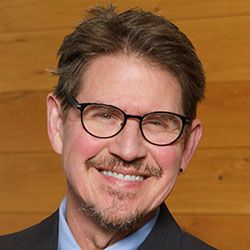Innovation Lab Demos Spotlight “Technology for Law”
Teams of computer science and law students developed computational solutions to improve legal services delivery
Computer Science (CS) training helps Northwestern Law students assess how computation is changing the practice of law and how legal principles govern technology. Likewise, Northwestern Engineering students benefit from problem-solving the challenges of legal practitioners.

At the intersection of CS + Law, the COMP_SCI 397, 497: Innovation Lab: Building Technologies for the Law course, co-taught by Linna and Northwestern Engineering’s Kristian Hammond, Bill and Cathy Osborn Professor of Computer Science, immerses multidisciplinary student teams in a collaborative effort to develop practical solutions for problems posed by external client partners.
“Students work with people outside their field and point of view to address genuinely pressing problems in the law with computational solutions,” Hammond said.

Common project goals across teams included improving efficiency and accuracy through automation; reducing costs by eliminating the need for attorneys to perform labor-intensive, manual tasks; and designing value-added functionality to existing, familiar interfaces such as Microsoft Word to streamline processes.
One team collaborated with the Northwestern University Feinberg School of Medicine Institute for Augmented Intelligence in Medicine to develop software called tABLEtransfer. The platform expedites the data sharing agreement drafting process managed by the Northwestern Office of Sponsored Research (OSR) to authorize data transmission from a Northwestern investigator to external researchers. tABLEtransfer feeds inputs from a questionnaire completed by the investigator into an algorithm that labels the requested patient data in accordance with protected health information guidelines, and then populates a data sharing agreement for review and approval by OSR prior to sharing with the general counsel representing the external researcher. Once the data sharing agreement is signed, a data analyst can use the original questionnaire information to compile the appropriate data for the external researcher from the Northwestern Medicine Enterprise Data Warehouse.
Another team partnered with global law firm Mayer Brown to develop ClausIT, a product designed to help attorneys drafting fee letter agreements efficiently incorporate the client’s preferred language into a precedent document. The tool is a clause-tracking database plug-in for Microsoft Word that eliminates the tedious and time-consuming task of manual document searches. Within the Word interface, an attorney can compare language used across company agreements, replace language with clauses from previous agreements, register new clauses to add language to the company-specific database, and view both the frequency of use case and the date the language was last used in a document.
Other projects with client partners included:
- McGuireWoods: The student team prototyped a mergers and acquisitions checklist tool called Checkmate to aid attorneys in efficiently and accurately managing complex closing checklists that contain critical and time-sensitive tasks. The Checkmate software uses a library database to populate the closing checklist with deliverables mined from the specific purchase agreement for the deal and includes a mechanism for attorneys to add supplemental information, such as the responsible person, due date, or task status.
- LexShift: The student team developed Omnibuster, a platform designed to enable legal professionals to efficiently perform a comprehensive review of omnibus bills – often hundreds of pages long with thousands of internal and external cross-references – to aid in the analysis of how the bill changes current law and potentially impacts a client.
- Thompson Reuters: The student team built a product to extract and classify information from court dockets and evaluate classifications for bias.
A panel of three expert judges provided feedback on the students’ solutions, asked questions to explore and evaluate functionality of the tools, and suggested potential future directions for further development of the prototypes.
Judges included:
- Kunoor Chopra, cofounder and vice president of legal services at Elevate
- Nick Long, managing director of legal and business services at Deloitte
- Irina Matveeva, chief of data science and artificial intelligence at Reveal
At the conclusion of the event, Linna invited the expert panel to share their perspectives on how the students’ experience in the Innovation Lab course will translate to careers in the legal profession and beyond.
“What stands out to me is the collaboration among people pursuing different degrees,” Chopra said. “By bringing together these different backgrounds, you've come up with some interesting and innovative ideas and ways to address different functionality.”
Long, who first joined the program several years ago as a client partner, added his perspective on the course’s approach to problem-solving.
“For decades, people have talked about how law as a profession is so slow to change, and yet what I saw in every one of these presentations today was a fresh approach to taking a problem apart,” Long said. “This program is teaching students to be open thinkers and to tackle the many challenges of the legal profession in a completely different way.”
Matveeva drew on the parallels of her own experience working in the legal profession with a computer science background.
“Learning about the legal space opens up interesting ways to apply technology and creates a level of appreciation for what users experience in their daily work,” Matveeva said. “I’ve also observed that attorneys who understand technology on a deeper level are much more willing to use it to innovate.”
Hammond thanked the students and expressed how proud he is of the teams and how impressed he is with their work and collaboration.
“People on the law side should be aware of what technological change can mean for them and people on the computer science side should never forget how they can impact and change the world,” Hammond said.
Program assistant Francesca Bullerman and David Shekman, a first-year law student at Northwestern’s Pritzker School of Law, helped organize the event.
The Innovation Lab is one component of the Northwestern University Law and Technology Initiative, a partnership between Northwestern Engineering and the Pritzker School of Law, which also includes joint research projects, training workshops, and academic conferences.
